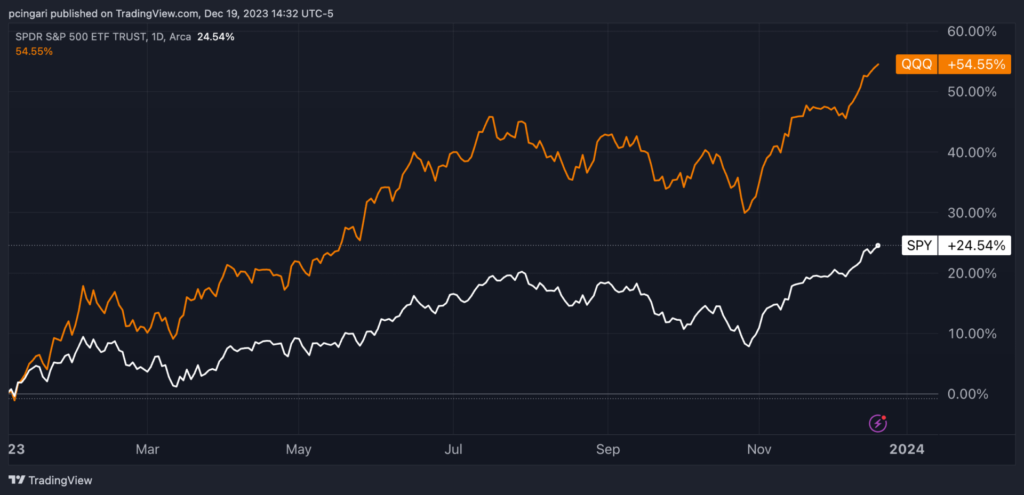Zinger Key Points
- In 2023, U.S. tech stocks soared 54% from a low start, evoking the tech boom of 1999.
- Wall Street managers grapple with maintaining risk appetite during the year-end "Santa Rally."
- Get real-time earnings alerts before the market moves and access expert analysis that uncovers hidden opportunities in the post-earnings chaos.
As we bid farewell to 2023 and eagerly anticipate the holiday season, it’s an opportune moment to reflect on the remarkable turnaround in the U.S. stock market this year.
At the beginning of the year, tech stocks in the Nasdaq 100 index were trading below the 11,000-point mark, battered by the wave of the Federal Reserve’s aggressive interest rate hikes in 2022.
Tech companies had plummeted by over 35% from their peak in late 2021. It was a turbulent start to the year, to say the least, with the pessimism over inflation and continuing rate hikes reigning supreme.
Fast-forward to the days leading up to Christmas 2023, the story takes a dramatic U-turn.
Tech stocks, as tracked by the Invesco QQQ Trust QQQ, surged to unprecedented all-time highs, soaring to 16,780 points and delivering astonishing year-to-date gains of 54%. Such an impressive performance has not been witnessed since the heady days of the tech dot-com boom in 1999 when the Nasdaq doubled in value within a year.
Read Also: Tech Stocks Set New All-Time High, Small Caps On Fire As Wall Street Bulls Run Wild
Chart: SPY vs QQQ Year-To-Date Returns As Of December 19, 2023

Is It Time For A Portfolio Manager To Hit The Sell Button?
Now put yourself in the hands of a portfolio manager who has achieved a similar or even higher performance than the SPDR S&P 500 ETF’s SPY 25% gain this year.
The average portfolio manager’s salary in the U.S., as per Salary.com’s latest data, stands at $116,610. However, much of a fund manager’s income is derived from performance-based incentives closely tied to the fund’s annual performance.
The allure of Wall Street’s cash bonuses, which can reach several thousand dollars annually, is undeniable. A study by New York State Comptroller Thomas P. DiNapoli in 2021, during the peak of the prior market cycle, revealed an average bonus of $240,400, with a record bonus pool totaling $42.7 billion.
With the market performance witnessed in 2023, it’s entirely plausible that the bonus pool for this year may surpass even the record-breaking 2021 figure. In stark contrast, 2022, the year of the market collapse, saw Wall Street’s bonuses decline by 26%, with the average fund manager still adding $176,000 in cash to their income.
For seasoned hedge fund managers, the bonuses can reach into the millions in a prosperous market year, highlighting the potential rewards for those who navigate the markets adeptly.
Wall Street Managers Love Risk
With just six trading days remaining in the year, the average Wall Street manager confronts a pivotal dilemma: Do they dare to embrace the looming uncertainty, or do they opt for a more conservative approach, safeguarding their already substantial year-end bonuses?
Recent history indicates that Wall Street’s portfolio managers typically exhibit a particular appetite for risk, steering clear of the brakes even in years when markets witness noteworthy upswings well into mid-December.
This steadfast adherence to their strategy is evident in the enduring phenomenon known as the “Santa Rally,” where markets traditionally surge during the holiday season.
This indicates that Wall Street portfolio managers have often shown the resilience to resist the urge to offload their riskier holdings and instead secure a guaranteed profit as they approach the end of a positive year for markets.
Read also: US ETFs Surpass $8 Trillion In Assets: Top 10 Funds Holding Over $100B Each
Is This Time Any Different?
A pertinent example is the year 2021, when after a 25% rally from January to November 2021, the S&P 500 had the momentum to push up another 2.5% by year-end.
In 2020, following a remarkable 70% rally from Covid-19’s March lows to mid-December, the market further extended its ascent in the final weeks of the year.
Similarly, in 2019, the stock market posted a 27% gain from January to Dec. 19 and closed the year with a 29% performance.
So, the question lingers as we approach the end of 2023: Is this time any different?
Caution is always advised, particularly in the wake of this year’s market rally. Nevertheless, recent history offers little evidence that the performance-based structure underpinning Wall Street portfolio managers’ incomes will curb the enthusiasm around the Santa Rally’s rally.
Read Now: We’re In For A Santa Claus Rally Alright — But It Might Be Subpar: Here Are 5 Reasons Why
Image: Shutterstock
© 2025 Benzinga.com. Benzinga does not provide investment advice. All rights reserved.
Trade confidently with insights and alerts from analyst ratings, free reports and breaking news that affects the stocks you care about.